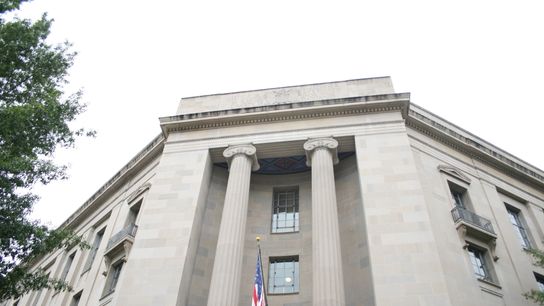The next time a buddy tells you the NCAA needs to "take control" of the Portal, show them this article.
The US Justice Department on Thursday joined 10 states and the District of Columbia in their ongoing civil antitrust lawsuit against the NCAA for the enforcement of its lightest transfer restrictions.
The move comes one month after a US District Judge ruled in favor of seven states suing the NCAA, arguing that the rule against two-time undergraduate transfers was a violation of antitrust law and unduly stringent on athletes and "likely" violated Section 1 of the Sherman Act.
That suit was brought by Ohio, Colorado, Illinois, New York, North Carolina, Tennessee and West Virginia, and ruled on in the Northern District of West Virginia. Minnesota, Mississippi, Virginia and DC have since joined.
Last January, the NCAA attempted to put up so-called "guardrails" around the Portal by denying the "overwhelming majority" of undergraduates who sought a waiver to transfer a second time and compete immediately.
The seven states sued to strike that rule down, and courts ruled in their favor.
The NCAA responded by releasing a memo saying that multi-time transfers could play immediately in 2024, leading to a flurry of new Portal activity in late December and early January. The NCAA has said it might raise the eligibility requirements for multi-time transfers, and the AFCA said it would support such a move earlier this month.
If that comes to pass, I would honestly expect the states to then argue that the NCAA isn't allowed to enforce any eligibility rules, and the courts to rule in their favor.
In the here-and-now, the Justice Department says it is "proud" to stand with the states to fight for the right to transfer and play immediately.
“We are proud to stand with our state law enforcement partners on behalf of college athletes across the nation,” said Assistant Attorney General Jonathan Kanter of the Justice Department’s Antitrust Division. “NCAA Division I institutions compete with each other not just on the playing field or in the arena, but to recruit and retain college athletes. College athletes should be able to freely choose the institutions that best meet their academic, personal and professional development needs without anticompetitive restrictions that limit their mobility by sacrificing a year of athletic competition.”
The Justice Department said that by deterring transfers, the NCAA "denies athletes educational opportunities."
The NCAA contends multi-time undergraduate transfers are less likely to graduate.
“We want every student-athlete to earn a degree as part of their college experience. Our rules have to be focused on that important objective,” Georgia president and NCAA Division I Board of Directors chairman Jere Morehead said last month. “I think there are legitimate academic reasons not to have student-athletes engaged in multiple transfers. It does not achieve our goal in having student-athletes graduate from institutions. We’ve lost our way a bit here.”
Several people have argued that the only way out of this quagmire is for the NCAA to receive an antitrust exemption from Congress, and/or for the schools to enter into a collective bargaining agreement with the athletes. Neither are likely to happen soon.
Lori Trahan expounding on the issue: "This Congress just doesn’t seem like the Congress where we’re going to have a lot of bipartisan wins. These are big thorny, tough issues. I’m not optimistic that this is going to be a Congress where we figure out college athletics at large."
— Ross Dellenger (@RossDellenger) January 18, 2024
Unless and until a breakthrough happens on Capitol Hill, the NCAA and its (lack of) teeth around NIL and the Portal will remain at the mercy of the Justice Department.
As always, stay tuned to The Scoop for the latest.
